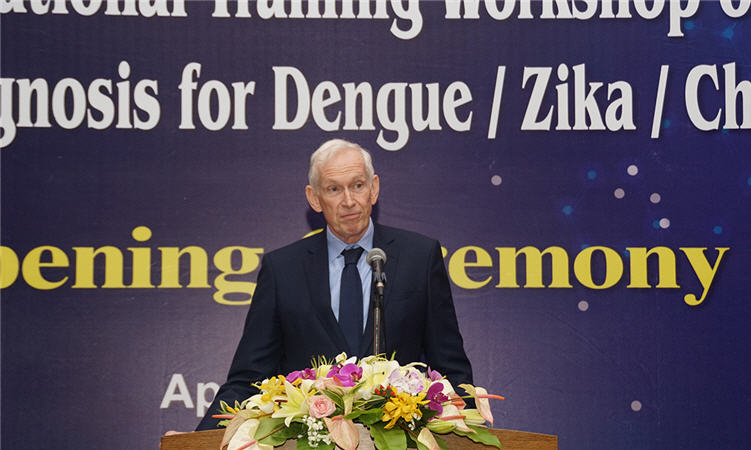April 25, 2017
AIT Official Text #: OT-1707E
Director Moy, thank you so much for the introduction.
Vice President Chen, Minister Chen, Minister Deng, Vice Minister Lee, friends from Taiwan, and those who have traveled here from all over the Asia-Pacific region and other parts of the world, good morning.
It is my great pleasure to be with you this morning to help open this workshop on public health, held under the joint U.S.-Taiwan Global Cooperation and Training Framework and under the auspices of AIT and TECRO.
We consider GCTF one of the signature programs in the U.S.-Taiwan relationship, built on our long history of strong cooperation.
As like-minded democracies with decades of close ties, it is only natural that the United States and Taiwan seek to jointly address emerging global and regional challenges that know no borders.
So, in June 2015, the American Institute in Taiwan and the Taipei Economic and Cultural Representative Office established this program, and I’m proud to be here today, as we approach its second anniversary.
Through GCTF, we share and promote best practices to help experts, such as all of you in attendance, build capacities in your home countries to tackle issues that cross borders and affect the daily lives of your families.
In our increasingly connected world, the biggest challenges will only be solved through international cooperation.
The GCTF has been a resounding success in its first two years, with six workshops held in Taiwan focused on public health, energy efficiency, women’s empowerment, and e-commerce.
Dozens of experts, government officials, and civil society leaders from countries around the Asia and Pacific region visited Taiwan for each one.
And I understand that today we have 35 participants who have traveled here from 18 countries around the world! The prize for longest commute goes to our friend, Mr. Ito Journel, joining us all the way from Port-au-Prince, Haiti.
These events have helped advance progress on issues of shared concern to us all: protecting our people from pandemic diseases, improving energy security through technological innovations, and promoting economic opportunity and gender equality.
These programs also demonstrate to the global community why Taiwan should be welcomed as a part of the solution to these problems, given its geographical position at the heart of Asia, its robust economic and people-to-people ties with all of your countries, and its own significant experience and demonstrated capacity.
We continue to support Taiwan’s meaningful and substantive contributions to the international community. In particular, the United States has welcomed Taiwan’s participation as an observer at the past eight World Health Assembly meetings. We look forward to Taiwan’s continued participation at this important event.
Our cooperation with Taiwan on global issues has now expanded outward to encompass more partners in more places around the world.
As you can see, our aim is to provide more than technical expertise. Our goal is to create networks and build bridges between Taiwan, Southeast Asia and South Asia, the Pacific, the Caribbean, and beyond.
We strongly believe this kind of cooperation will deliver tangible benefits to the global community and strengthen all of our mutual bonds.
I thank our friends in the Ministry of Foreign Affairs and the Ministry of Health and Welfare, particularly the Taiwan Centers for Disease Control, for hosting us today. I thank our expert presenters based in Thailand who could be here today as well for their outstanding efforts.
And we want to particularly recognize each of you who came here this week, for your contributions and strong support for the international cooperation that is needed to make our world a better place to live.
I wish you all a productive workshop and enjoyable visit to Taiwan. Thank you.
















![Video Thumbnail [Recovered]-01](../wp-content/uploads/sites/269/Video-Thumbnail-Recovered-01-1-750x450.jpg)





